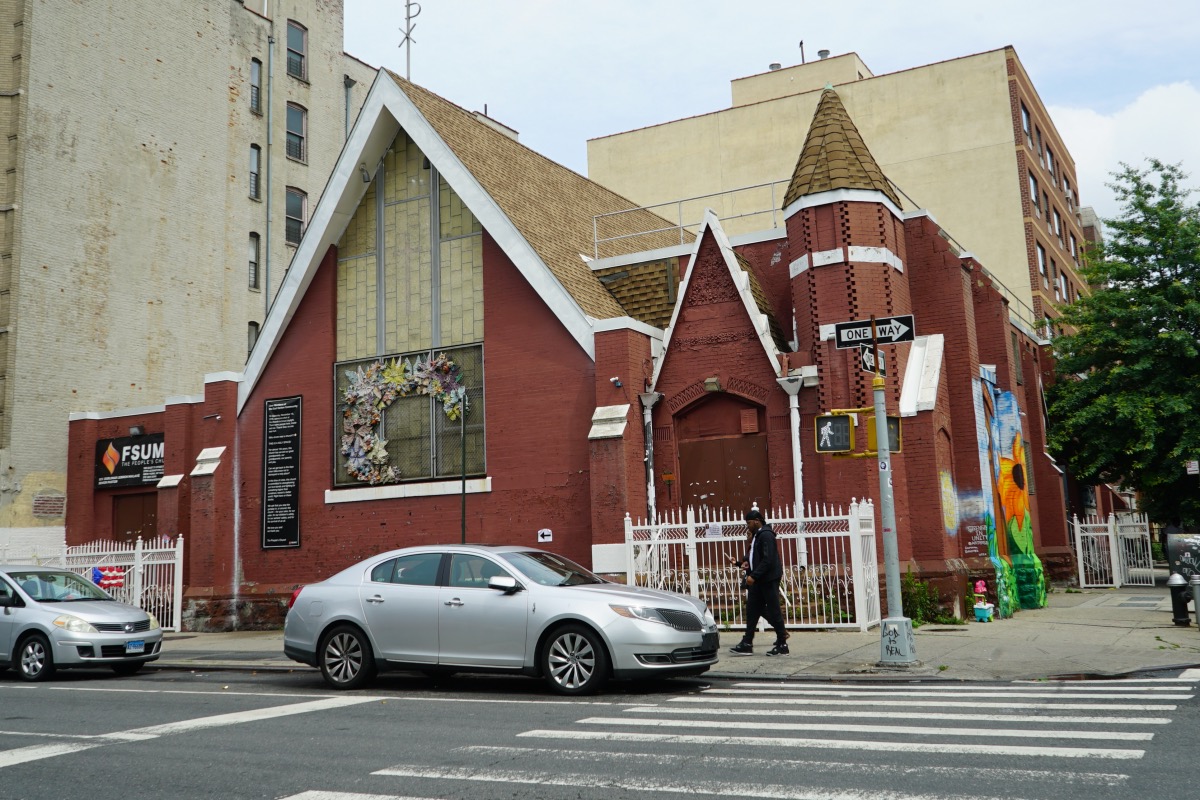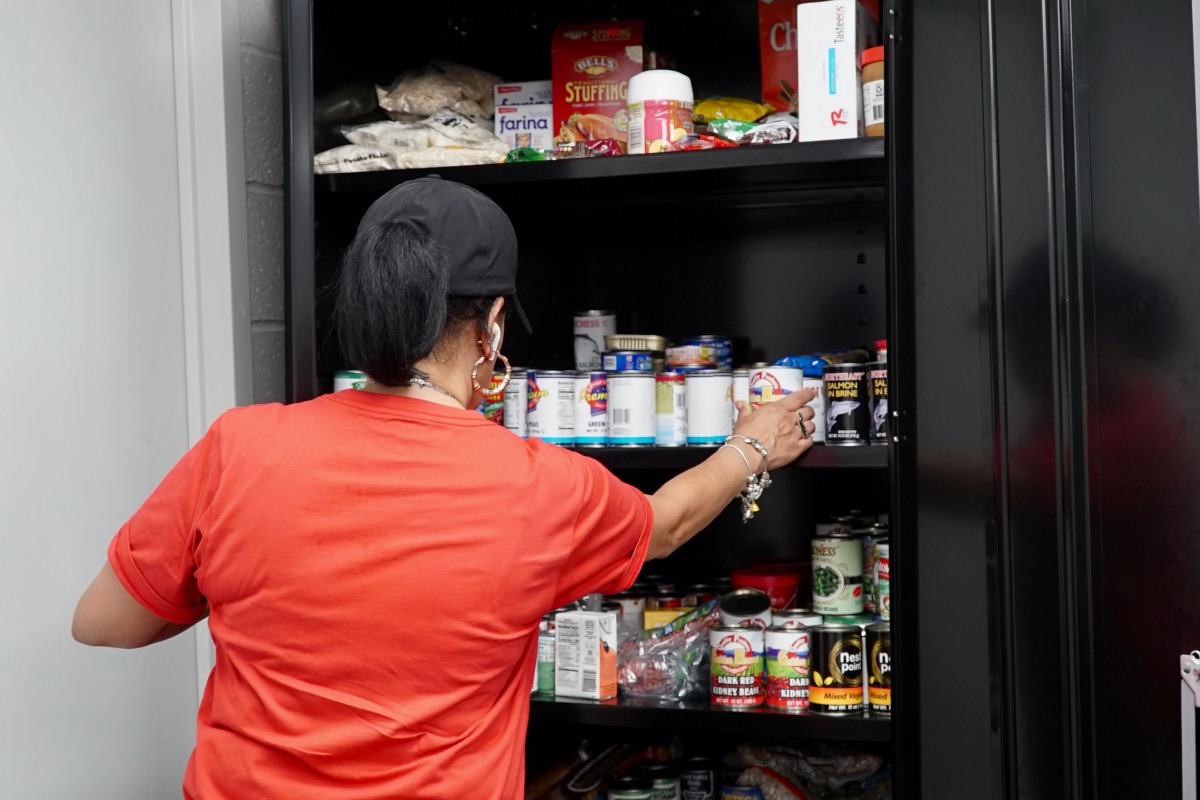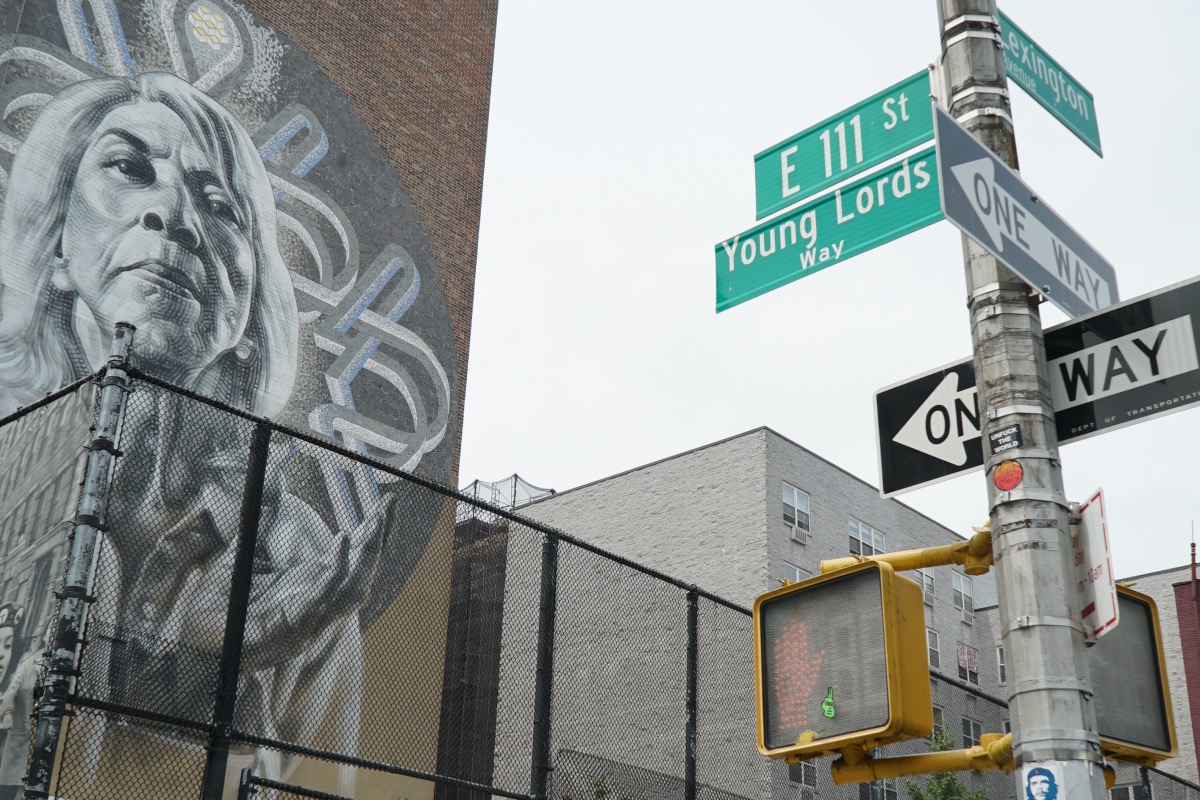

First Spanish United Methodist Church in East Harlem, New York (Mariana Martínez Barba/Latino Rebels)
On a humid afternoon in late June, a small crowd gathers outside First Spanish United Methodist Church (FSUMC) in New York City’s East Harlem neighborhood. Women supervise children playing along the sidewalk, while men adjust their backpacks and brush sweat from their brows, waiting to be invited inside.
The group is made up of Central and South American migrants seeking asylum in the United States. Multiple times a week, they visit the church to receive food, clothing, and other necessities that they’ve struggled to find elsewhere in the city.
“We’ve been getting around 30 to 40 families per week,” says Vilma “Vee” Rivera, a lifelong resident of East Harlem who oversees the church’s support services for asylum seekers. “People call me every day asking, ‘Are you open?’”
FSUMC, commonly known as “The People’s Church,” has a history of supporting the Latino communities that have called East Harlem home for 100 years. Over the past nine months, Rivera and other volunteers have added to that legacy, creating a safe haven and resource hub for migrants arriving from the southern border.
“These are people who come here with nothing,” Rivera explains. “I want this to be a space where they can sit with their kids, have a plate of food and feel comfortable.”
A Much-Needed Lifeline
The church’s assistance program for migrants has grown significantly since launching in September 2022. In addition to dispensing hot meals and clothing, Rivera and her team set up English classes for asylum seekers through the fall and winter. They also helped establish an Occupational Safety and Health Administration certification course, providing a pathway for migrants to work in construction.
These services have been kept afloat by volunteers and community donations, as well as work from the migrants themselves.


A staff member retrieves items from the church’s food pantry. (Mariana Martínez Barba/Latino Rebels)
“They help us with whatever they can,” says Carmen Rosado, a neighborhood resident and artist who’s been volunteering at the church since the fall. “They see what we’re doing for them and they want to pay it back.”
The church’s services have been indispensable for asylum seekers like Karen, 29, who left her native Ecuador with her husband and two children to start a new life in the U.S. Since arriving in New York City two months ago, Karen and her husband haven’t been able to secure steady work, forcing the family to rely on social services to survive.
“Employers ask for our IDs and social (security numbers),” she tells Latino Rebels. “We don’t want to depend on others, but until we get our work permits, we have no choice.”
The People’s Church has provided Karen with a sense of security and belonging that’s been missing since she arrived in New York, and the meals her family receives there are a welcome substitute for the food served at city shelters, which she says can be more than three days old.
Though donations to FSUMC have remained steady since September, Rivera and her team still lack the resources and staff to care for every migrant who visits the church.
“The saddest part of the day is when we run out of food,” Rosado says. “And we have to tell families with kids to come back tomorrow.”
Helping the Underserved Across Generations
The People’s Church has been a hub for immigrant communities in East Harlem —known colloquially as “Spanish Harlem” or “El Barrio”— long before it began welcoming asylum seekers. In the winter of 1969, it was occupied by the Young Lords, a revolutionary socialist and civil rights organization fighting for Puerto Rican independence and the empowerment of not just Latinos but all underserved and marginalized communities.
Inspired by the ideology and tactics of the Black Panther Party, the Young Lords’ New York chapter occupied the church for 11 days, offering meals and medical services to local residents and running a daycare with Spanish classes and Puerto Rican history lessons.


A stretch of East 111th Street in East Harlem, New York was renamed “Young Lords Way” in honor of the socialist revolutionary and civil rights group that occupied First Spanish United Methodist Church in 1969 to provide food and services for local residents. (Mariana Martínez Barba/Latino Rebels)
Tanya Sanchez had not yet been born when the Young Lords took control of The People’s Church, but her parents remember the occupation and the group’s activities in the neighborhood.
“They wanted the community to be better,” recalls Sanchez, whose family has lived in East Harlem for multiple generations. “They wanted everyone to succeed, especially the Puerto Rican community.”
More than 50 years later, Sanchez has been contributing to the church’s assistance program for migrants, creating flyers to increase donations and connecting families to legal services in the city. Sanchez drew parallels between the church’s services for asylum seekers and the Young Lords’ community outreach.
“I feel like we’re repeating history,” she says. “It feels good being here and seeing the smiles on everyone’s faces, knowing that we’re here for them and our doors are open.”
Filling Gaps in the City’s Response
The People’s Church is one of many organizations assisting the roughly 70,000 migrants who’ve arrived in New York City since 2022, according to local estimates. More than 50,000 were living in city shelters as of late June, outnumbering unhoused New Yorkers for the first time.
The influx of migrants has put an unprecedented strain on the city’s social safety net, prompting officials to begin sending asylum seekers to other parts of the country.


Bible verses are written on rainbow-colored canvases in honor of Pride Month at the altar of The People’s Church in East Harlem, New York. (Mariana Martínez Barba/Latino Rebels)
New York City is “carrying the burden of a national problem,” Mayor Eric Adams told CBS’s Face The Nation in May, arguing that all U.S. cities have an obligation to house and care for migrants.
Local advocacy groups say New York’s strategy for assisting asylum seekers has been flawed from the start.
“Even in the initial phase, there was no apparatus on the city’s end to supply (migrants) with tangible goods,” says Adolfo Abreu, the housing campaigns director at VOCAL-NY, a social services organization. “We saw a lot of mutual aid groups naturally step in and provide folks with things they needed, whether it’s food, clothing or interpretation services.”
Rivera says The People’s Church will continue supporting migrants as long as the need remains great. The thought of families going hungry in the city’s shelters makes her determined to keep the program going, even if it means dipping into her own savings.
“These are human beings,” she says. “They didn’t want to be here broke or without work, having to depend on other people. And how they’re being treated isn’t right.”
***
Illan Martin Ireland is a summer correspondent at Futuro Media and a graduate of the Columbia University Graduate School of Journalism.



How can folks get in touch with the People’s Church to volunteer?